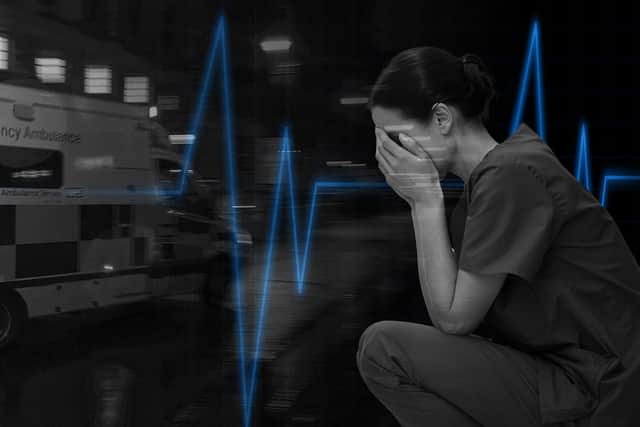NHS crisis: staff worried about how many patients they ‘would kill’ amid ambulance and emergency care delays
and live on Freeview channel 276
NHS staff asked each other “how many people are we going to kill today?” amid critical ambulance waiting times and major delays to emergency care, a concerning new report has revealed.
A report by the Healthcare Safety Investigation Branch (HSIB), which looked into how working conditions and staff wellbeing impact patient safety, has found that doctors, nurses, paramedics, and emergency call handlers have faced “significant distress” over the past year due to not being able “to do the right thing by all patients”.
Advertisement
Hide AdAdvertisement
Hide AdMany workers “cried or displayed extreme emotion” when talking about their working environment - and others described the intense “moral burden” of having to decide which patients in queueing ambulances to send through to the emergency care department for treatment. Meanwhile, the majority said the state of the healthcare service was affecting their personal lives, with several staff members struggling to switch off to interact with friends and family and those who live alone reporting feeling “isolation and despair” after difficult days.
Dispatchers for 999 even told the HSIB it was common to worry about “how many patients [they were] going to kill today”, due to their frustration at not being able to send ambulances to unwell patients. On some of these occasions, there would be more than 100 Category 2 calls waiting (the second most urgent category), with no ambulances available to respond.
Staff also said they felt that wellbeing and support was reactive rather than proactive - and primarily relied on workers seeking out help themselves. These help services, they said, were also only prioritised by NHS organisations when “there was time to do so”, which means help often came “too late.”


Elsewhere, the HSIB found anxiety, stress, depression, and other forms of psychiatric illness were consistently the most reported reason for staff sickness within the health service. According to the latest figures for September 2022, this meant almost 500,000 full-time days were lost in a single month as a result of just this category - an 11% increase since 2019.
Advertisement
Hide AdAdvertisement
Hide AdThese findings led to the report concluding that “whilst staff are trying their best to give good care, harm is happening and that affects the outcomes for patients and the ability for them to stay well.” It also argued there was a “strong link” between patient safety and wellbeing, and emphasised that the two national plans overseeing both areas - the NHS People Plan and the NHS Patient Safety Strategy - were not yet interlinked.
Neil Alexander, the report’s lead investigator, commented: “This report reflects the in-depth conversations we have had with staff over the course of this investigation about the emotional impact of their work. We heard words like ‘demoralising,’ ‘powerless’, ‘hurt’, ‘relentless’ during our interviews with them, and many expressed they are feeling the burden and experiencing moral injury.”
He added that “distress over delays” was highlighted in particular by many interviewees, with many concerned about the “harm” being caused to patients as a result. Staff also spoke about the impacts these problems are having on their “personal wellbeing”, Mr Alexander continued.
Looking to the future, the HSIB has advised that in the short term, staff need to be “given the time and space to engage in reflective practice and get support from people with expertise in staff wellbeing.”
Advertisement
Hide AdAdvertisement
Hide AdThis would mean creating sessions wherein NHS workers can come together to speak openly and confidentially about their experiences, and the emotional impact of their work. When asked, many staff said they believed they would benefit from this, and that the process would be “cathartic”.
In the long term, the HSIB has recommended that the NHS “ensures the intrinsic link between patient safety and staff wellbeing is captured at a national level.” Otherwise, there will be “further deteriorations in staff wellbeing” - which has a detrimental effect on both patient experience and safe care.


A spokesperson for NHS England told NationalWorld: “There is no doubt that NHS staff have faced significant challenges this winter with record demand for urgent and emergency care, high levels of bed occupancy, difficulties discharging patients, and the combined impact of Covid and flu making this the busiest winter ever.
“The safety of both patients and staff is vital, and the NHS takes staff health and wellbeing incredibly seriously with a range of support including dedicated helplines, wellbeing apps, and coaching - as well as the option of flexible working - and we will shortly publish an update to our Patient Safety Strategy which will include detail on staff safety.”
Advertisement
Hide AdAdvertisement
Hide AdThe Department of Health and Social Care added: “We continue to support NHS staff as they tackle the Covid backlogs and we’ve published an urgent and emergency care recovery plan to further reduce pressure on hospitals by scaling up community teams, expanding virtual wards, getting 800 new ambulances onto the roads, and funding for staffing to go alongside that.
“This supports the £750 million we have already made available which will speed up delays in getting healthy people out of hospital and free up beds this winter. For those that need it, the NHS provides physical and mental health support for staff, including targeting psychological support and treatment for those most affected.”
Comment Guidelines
National World encourages reader discussion on our stories. User feedback, insights and back-and-forth exchanges add a rich layer of context to reporting. Please review our Community Guidelines before commenting.
